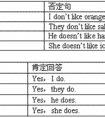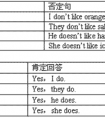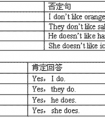改错。( ) 1. What's you father?_________________A B C ( ) 2. My mother is doctor. _________________A BC ( ) 3. She look young._________________A B C ( )-四年级英语
3)an还用在发音以元音开头的单个字母前面:
例如:an L-plate一块“实习驾驶”车牌 an MP一个国会议员 an SOS一个呼救信号 an‘x’一个x字母、X形的东西或未知数
4)a/an没有性的变化:
例如: a man一个男人 a woman一个女人 an actor一个男演员 an actress一个女演员
不定冠词与数词one区别:
不定冠词与数词one都可表示“一”的意思,前者可视为后者的弱式。
如:I have a [one] brother and two sisters. 我有一个兄弟和两个姐妹。
但是,尽管两者有时可换用,但由于两者词性和用法不同,在多数情况下不能互换,其主要区别有以下几点:
区别一:
从本质上说,不定冠词侧重指“类别”概念,而数词one侧重指数量概念。有时尽管两者都可用,但含义有差别:
I bought a dictionary yesterday. 我昨天买了本词典。(意指买的是词典,不是语法书,也不是钢笔等)
I bought one dictionary yesterday. 我昨天买了一本词典。 (意指买的是一本词典,不是两本或三本词典等)
"Can a boy do it?" "No, but a man can." “小孩做得了吗?”“做不了,要大人才行。”
"Can one boy do it?" "No, but two (boys) can." “一个小孩做得了吗?”“不行,要两个小孩才行。”
区别二:
当要强调数量概念或进行数量对比时,只能用数词 one。如:
"How many pens do you have?" "I have one (pen)." “你有几支钢笔?”“我有一支钢笔。”
I want one apple, not three apples. 我要一个苹果,不是三个苹果。
区别三:
若不是表示“一”的数量概念,而是表示“类别”概念,则只能用不定冠词。如:
A computer is useful. 电脑是有用的。
He is an excellent teacher. 他是位优秀的教师。
区别四:
在某些短语中,两者均可用,含义相同。如:
at a [one] blow 一下子,一举
in a [one] word 一句话,总而言之
而在某些表达中,两者均可用,但含义不同。如:
at a time 每次,同时
at one time 一度,曾经
还有一些表达,两者均可用,虽含义相同,但表达不同。如:
on a hot summer afternoon 一个炎热的夏日的下午 (用介词 on)
one hot summer afternoon 一个炎热的夏日的下午 (不用介词 on)
an hour and a half 一个半小时 (不说 one hour and a half)
one and a half hours 一个半小时
a minute or two 一两分钟 (不说 one minute or two)
one or two minutes 一两分种
注意,在绝大多数习语中,两者是不能换用的。如:as a result 结果,all of a sudden 突然,one day 一天,one by one 一个一个地,等等。
区别五:
与表示时间或度量衡的名词连用表示“每”时,只用不定冠词。如:
Brush your teeth twice a day at least. 每天至少要刷牙两次。
They are sold at two dollars a dozen. 他们的售价是每打两美元。
考点名称:介词
- 介词:
是用来表示它后面的名词(代词)或起名词作用的短语、从句与句中其他成分之间的关系。
介词是英语中很活跃的词,一般置于名词之前。它常和名词或名词性词语构成介词短语。
同一个介词常和不同的词语搭配形成固定搭配,表示不同意义。 介词分类:
一、表示地点位置的介词
(1)at, in, on, to, for
at 表示在小地方;表示“在……附近,旁边”。
in 表示在大地方;表示“在……范围之内”。
on 表示毗邻,接壤,“在……上面”。
to 表示在……范围外,不强调是否接壤;或“到……”。
(2)above, over, on 在……上
above 指在……上方,不强调是否垂直,与below相对;
over 指垂直的上方,与under相对,但over与物体有一定的空间,不直接接触。
on 表示某物体上面并与之接触。
例:The bird is flying above my head. 小鸟在我的头上飞。
There is a bridge over the river. 在河上有一座桥。
He put his watch on the desk.他把他的表放在了桌子上。
(3)below, under在……下面
under 表示在……正下方
below 表示在……下,不一定在正下方
例:There is a cat under the table. 桌子底下有一只猫。
Please write your name below the line. 请在横线下写上你的名字。
(4)beside,behind beside 表示在……旁边
behind 表示在……后面
二、表示时间的介词
(1)in,on,at在……时
A、in表示较长时间,如世纪、朝代、时代、年、季节、月及一般(非特指)的早、中、晚等。
如:inthe1950s, in1989, insummer, inJanuary, inthemorning等。
B、on 表示具体某一天及其早、中、晚。
如:on May 1st, on Monday, onNew Year’s Day, on a cold night in January, on a fine morning, on Sunday afternoon等。
C、at 表示某一时刻或较短暂的时间,或泛指圣诞节,复活节等。
如:at 3:20, at this time of year, at the beginning of, at the end of, at the age of, at Christmas, at night, at noon, at this moment等。
(2)after在……之后 “after+一段时间”表示过去的一段时间以后;
“after+将来的时间点”表示将来的某一时刻以后。
三、其它常用介词
(1)about关于,附近,大约,周围,随身.
I have bought a book about Shakespearean. 我买了一本有关莎士比亚的书。
There are about fifteen trees in the picture. 大约有十五棵树在图片里。
(2)across横过,对面,交叉,在……的对面
Can you swim across the river? 你能游过河吗?
We live across the street. 我们住在街的对面。
(3)along沿着,顺着.
They are walking along the river. 他们沿着河行走。
(4)by 被……,在……的近旁,在……之前,不迟于,以……为手段。
The class room was cleaned by the students. 教室由学生们打扫干净了。
Miss Lucy came to China by air. 露西小姐是乘飞机来中国的。
(5)for为……,因为……,至于……。
He works for this company. 他为这家公司工作。
She came back to the classroom for she had lef the books in the class room. 她返回到教室是因为把书留在了那里。
(6)from从……,来自……,因为……
Where are you from? 你是哪里人?
He diedf rom an accident. 他死于一场事故。
(7)of……的,属于……
This is a map of China.这是一张中国地图。
(8)with使用、和……在一起
We write with a pen. 我们用笔写字。
- 最新内容
- 相关内容
- 网友推荐
- 图文推荐
| [家长教育] 孩子为什么会和父母感情疏离? (2019-07-14) |
| [教师分享] 给远方姐姐的一封信 (2018-11-07) |
| [教师分享] 伸缩门 (2018-11-07) |
| [教师分享] 回家乡 (2018-11-07) |
| [教师分享] 是风味也是人间 (2018-11-07) |
| [教师分享] 一句格言的启示 (2018-11-07) |
| [教师分享] 无规矩不成方圆 (2018-11-07) |
| [教师分享] 第十届全国教育名家论坛有感(二) (2018-11-07) |
| [教师分享] 贪玩的小狗 (2018-11-07) |
| [教师分享] 未命名文章 (2018-11-07) |

![John _____________ an air-conditioner in _____________ bedroom.[ ]A. have, himB. has, hisC. has, he-五年级英语](http://www.00-edu.com/d/file/ks/4/1/23/2019-08-16/small54858f2c11067f43b6431ea11c99345f1565909294.png)


![What's his name? ____________ name is Li Ming. [ ]A. HisB. Her-三年级英语](http://www.00-edu.com/d/file/ks/4/1/23/2019-08-16/smallbf3f2eef41637228ad7cb0082b827bb31565909431.jpg)

